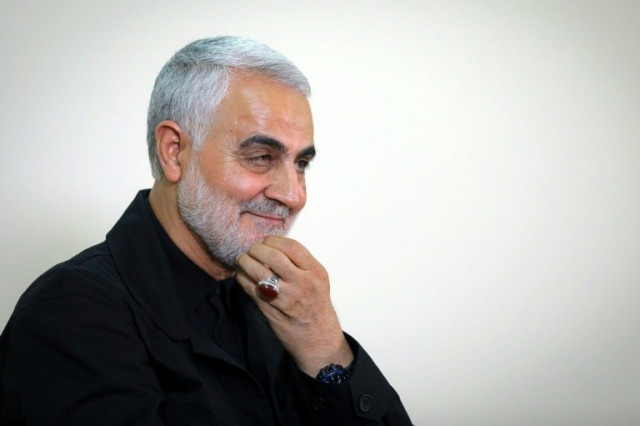Iran and the great power competition
It is obvious that another war in the region will have implications far beyond the Middle East

Qaseem Soleimani. PHOTO: AFP
James Mattis, while presenting the National Defense Strategy 2018, clearly pointed out that the great power competition has replaced global terrorism as the primary focus of the US national security. A number of US foreign policy experts and political leaders subscribe to this viewpoint.
The Trump administration’s abandoning of the Iran nuclear deal and re-imposition of crippling sanctions on Tehran has elicited defying responses from both Beijing and Moscow. The two states have not curtailed their business with Tehran and are instead willing to enhance investment in Iran’s energy and infrastructure sectors.
In the last few years, Beijing and Moscow have increased their political and economic cooperation to offset punitive sanctions against Russia since 2014 and the recent US trade war with China.
China and Russia have wisely profited from Trump’s renewed drive to isolate and pressurise Iran. Both countries are seeking to shape spheres of influence in the Middle East by expanding ties with Tehran. They have manipulated the economic space created by the Western players who had to comply with the US sanctions requirements.
By reaching out to Iran the two powers are focusing on increasing their influence in West Asia where the US influence is waning. In other words, American coercive actions have driven China, Russia and Iran to work together to counter US pressure.
There is historical precedence of China materially helping Iran as far back as the Iran-Iraq War of the 80s, and later emerging as an important player in the post-war reconstruction phase.
In recent years Beijing has helped thwart crippling sanctions against Iran by investing in the energy sector abandoned by the Americans and Europeans. It continues to provide the vital lifeline to Iran by expanding economic and military ties. Both countries had already agreed to strengthen bilateral defence cooperation in 2016.
China is currently importing a million barrels of crude oil from Saudi Arabia daily and is cognisant of the significance of its relations with the kingdom. However, the Chinese are increasing the import of Iranian oil to minimise dependence on a single supply source. More importantly, China sees Tehran as an important link in its Belt and Road Initiative (BRI).
Russia’s relationship with Iran took off in the late 1990s with Moscow assisting Tehran in development projects and later becoming the sole supplier of Iran’s nuclear sector. Of late, Russia is planning to assist the Iranian civil aviation sector and has also invested in Iran’s missile defense systems.
Despite Russia’s extra-regional location, the Indian Ocean has traditionally formed part of its strategy. The transformation of the Indian Ocean into a ‘’great game’’ arena between the US, India and China, challenges Moscow’s security interests. Unsurprisingly, Russia’s Maritime Doctrine 2020 perceives the Indian Ocean as one of Moscow’s major regional priorities.
Following the escalation of tensions with Iran since mid-2019, the US has opted for a military build-up and a coalition to protect Gulf waters. Around the same time, Moscow has introduced the concept of collective security in the Persian Gulf aimed at establishing a regional security and cooperation organisation — an idea that China endorses.
More tellingly, in December 2019, Iran, Russia and China conducted four-day joint maritime exercises in the Indian Ocean. The exercises were ostensibly carried out ‘’to fight terrorists and pirates in the Indian Ocean”. However, analysts are of the view that the joint drills were a message to the US that an attack on Iran can escalate into a broader conflict involving the world’s major nuclear powers. One would argue that while the joint exercises do not guarantee a rigid mechanism of military collaboration, they do suggest such a possibility.
By conducting joint maritime exercises with two countries that the US strategists view as primary threats to their global interests, Tehran has signalled political and military relevance in the face of US sanctions aimed at isolating it economically.
On the other hand, the US, India and Japan have convergent interests in containing the increasing Chinese influence. The Indian Navy has already been pushed into action to counter Beijing’s so-called “string of pearls” strategy along the Indian Ocean periphery.
Japan has increased its defense cooperation with India in recent years in view of the increasing Chinese power and presence in the Indian Ocean.
Tokyo has also recently announced sending a military vessel and two patrol planes to help protect the sea lanes. But in keeping with the complex nature of modern inter-state relations, it will not join the US-led coalition in view of its relations with Iran.
It is obvious that another war in the region will have implications far beyond the Middle East. Any direct confrontation with the US is bound to devastate Iran and its economic resources. However, Moscow and Beijing can tip the balance of power and decelerate the American juggernaut by making it clear that they intend to safeguard their own strategic interests in the region.
As rational actors and members of the Security Council, Russia and China must use their power to defuse the situation in the Gulf region and counter Trump’s madness with a calculated response.
Published in The Express Tribune, January 17th, 2020.
Like Opinion & Editorial on Facebook, follow @ETOpEd on Twitter to receive all updates on all our daily pieces.
















COMMENTS
Comments are moderated and generally will be posted if they are on-topic and not abusive.
For more information, please see our Comments FAQ